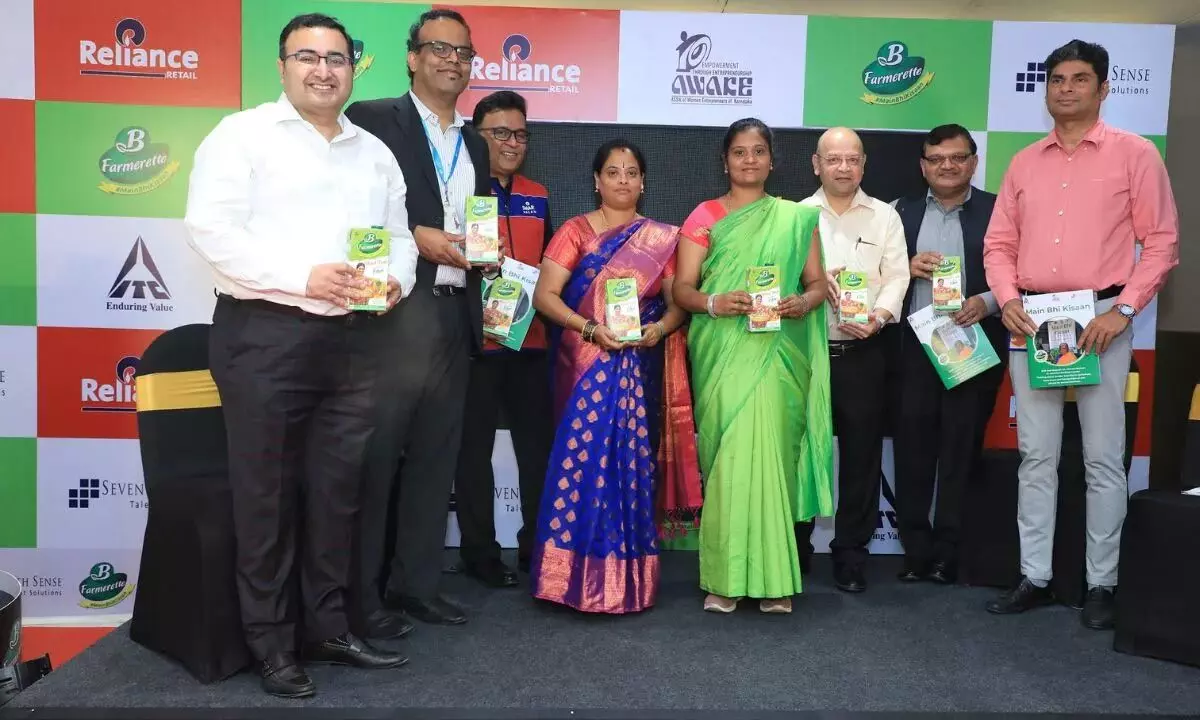600 women fruit farmers upskilled under ‘Naanu Kooda Raitha’ project

For nine years, 30-year-old Ramya has been helping her husband and his family take care of the one-acre land they own in Oolavadi in Chikkaballapura district about 20 km from here
Bengaluru: For nine years, 30-year-old Ramya has been helping her husband and his family take care of the one-acre land they own in Oolavadi in Chikkaballapura district about 20 km from here. She would have been one of the many that make up the 75% female workforce in India that slogs in the agricultural fields without any real acknowledgement. But all that changed when she signed up for “upskilling” last September. “I have learnt even about supply chains. There’s a wealth of knowledge that I could tap into in these workshops. More importantly, I learnt about money matters, too — pricing and value addition, etc. I am now convinced that organic farming could be a great advantage for us — not only will it fetch us more money, but we can even lead healthier lives without having to deal with chemical fertilisers,” Ramya told PTI. Ramya is one of the 600-odd women chosen from five districts in Karnataka — Chikmagalur, Chikkaballapura, Kolar, Chitradurga and Bengaluru Rural — to be imparted expert-led training in essential skills such as post-harvest management, stock management and bookkeeping in the first phase of ‘Naanu Kooda Raitha’ project. The project is organised by the department of horticulture of the Karnataka government in collaboration with Bengaluru-based non-profit organisations 7th Sense Foundation and AWAKE.
The project is funded by the ITC’s B Natural, as part of its corporate social responsibility (CSR) activity. “Because B Natural, a fruit beverages brand, is in the picture, we had chosen women involved in fruit farming. We began last September and held workshops in seven places till now. Our first phase of the project came to an end in March,” said Nidhi Nischal of 7th Sense Foundation. According to Nischal, the NGOs had tapped into their already available resources for the selection of women farmers. “We already have other projects in these villages and therefore, it was easier finding the eligible women farmers. We also invited women farmers to bring their friends from the same profession along,” said Nischal. That is how Vanitha came into the picture. The mother of two is Ramya’s neighbour and had moved into Oolavadi four years ago after getting married. “Initially, we were helping our uncle, who owned the one-acre land. But when he passed away recently, my husband’s family got possession of the land,” said Vanitha.
The problem, said Vanitha, was that while her husband’s family knew how to tend the field, they had no idea how to go about finding buyers, as their uncle had taken care of those things. “We were basically selling it to the middlemen who collect right at our farmstead, but at very low prices,” said Vanitha. So when she learnt that ‘Naanu Kooda Raitha’ project dealt with value addition and market linkages, Vanitha too signed up for the training.
“The biggest takeaway for us from our interaction with women farmers is that they have no idea about the financial side of farming. But without that knowledge, they can never be part of decision making.
Considering most women do not own lands, they are just relegated to doing the hard work without much say in other crucial decisions,” said Nischal.
When shown ways to enhance productivity, reduce waste, the difference in income between organic and conventional farming, and the advantages of multi-cropping, women farmers most often become more assertive with their families, said Nischal. Like Ramya who is determined to convince her family who is growing mangoes in their one-acre to switch to organic farming. Fostering independence in decision making is the first step to financial independence for these women, pointed out Nischal.
“These seven months we too have learnt a lot and have tailored our training accordingly. We will be focusing a lot on digital and financial literacy. Now, we are ready to take this initiative to other states too. We are targeting Maharashtra, Andhra Pradesh and Tamil Nadu next,” said Nischal.










